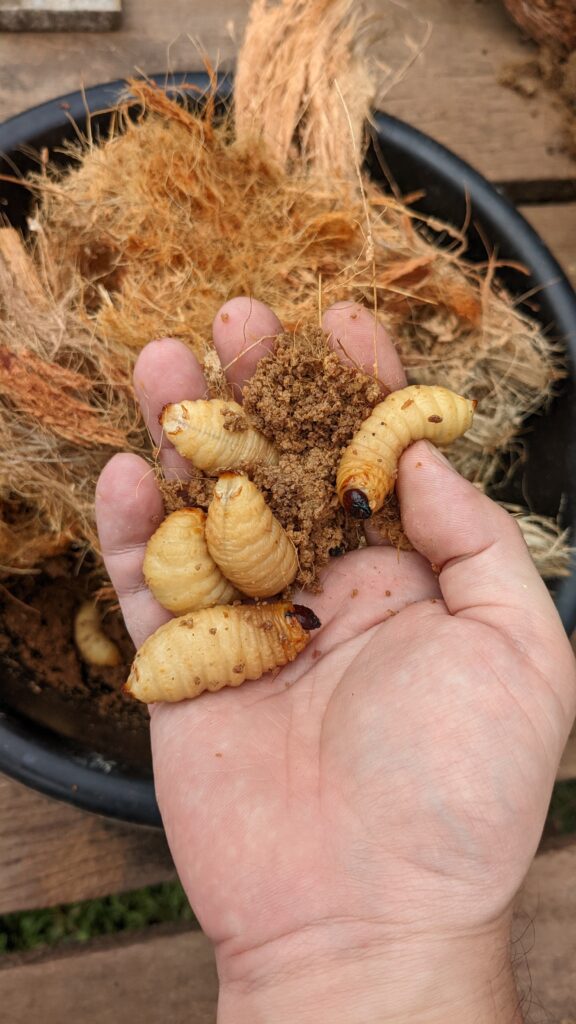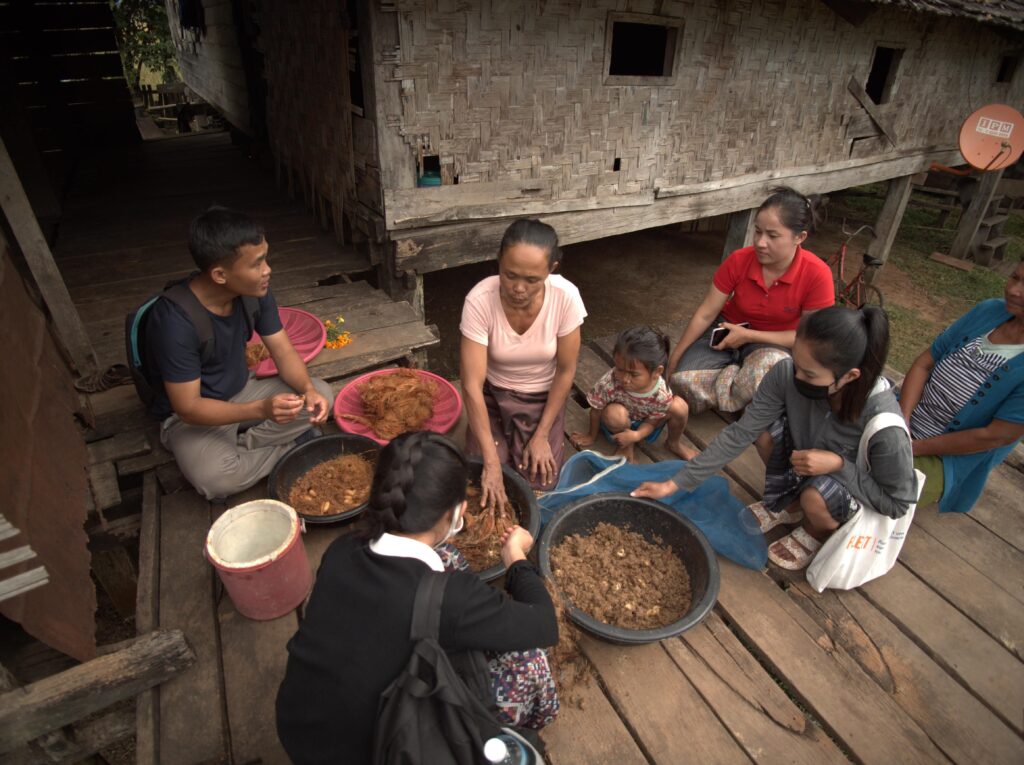Lao PRD boasts beautiful scenic countryside and is renowned for producing rice and eating insects. Insect expert Shinjiro Saeki, also known as the Mushi Sommelier (Insect Sommelier), enjoys eating insects. In addition, as the founder of the Oishii Konchu Seikatsu (Tasty Insect Life) project, he is employing his knowledge to create a nutritional enhancement approach for Lao PDR through insect consumption.
Tricky from the Perspective of Japan!?
Nutrition Improvement through Entomophagy
– What kind of activities do you do to improve people’s nutrition through insect eating in Lao PDR?
I am staying in Lao PDR as an insect expert, instructing insect farming and training nutritional volunteers. Lao PDR has a long-standing challenge of maternal and child malnutrition. We started with the question of whether it would be feasible to improve people’s nutrition, focusing on insects that are common local food. This program is now in its fifth year, beginning in 2017 with a grant from the Ajinomoto Foundation for three years and following that as a JICA Partnership Program (jointly organized by NGO ISAPH and NPO Edible Insect Science Research Society).
– What did you start with?
We started with creating a survey for nutrition research, including an insect category in the survey. In comparison with insects, we selected soybeans, beef, pork, chicken, and eggs. The results showed that more than 70% of people consumed eggs more than once a week, and by a similar margin, seasonal insects were eaten as well. Beef, pork, and chicken do not feature on daily dining tables because refrigerators are not commonly available. These are served at events such as weddings, funerals, and other ceremonial occasions. Considering these factors, I had the impression that the chemistry between their daily diet and insects was not subpar.
– From that point, have you started working on things like developing insect farming?
At first, we thought the issue was protein deficient, but as nutrition research progressed, we learned that protein was sufficient from wild foods such as frogs, fish, and insects. Rather, their oil intake was very low. For this reason, we opted for insect farming which could make up for the nutritional deficit.
– What kind of insects are you farming?
We are farming a large number of oil-rich insects called red palm weevils. The Lao weevil is even bigger than the Japanese giant weevil which is the largest species in Japan, and its larvae are full-bodied and incredibly filling. In Lao PDR, the most popular way to consume it is by adding it to soup or grilling it slowly with charcoal.

– How did the local people initially react to your activities?
They said it would be wonderful if farming could increase the amount of tasty food people eat every day. This easygoing response made it easy for us to carry out our activities. It may seem to be a very tricky project from the perspective of Japan; however, I believe it is a mild approach from the perspective of Lao, where people regularly eat insects. By the way, they call me “Aay Takkaten (Grasshopper brother).” (chuckle) In fact, I was trying to farm grasshoppers.
Insect farming aims to improve maternal and child nutrition and life
– How is insect farming spreading?
First, we provide the know-how to households that become farming teachers, and then those teachers teach others. Our first goal is to increase the number of farming households with the feeling that we can sell farmed insects, that insects are tasty, or that our neighbors are doing it, so we should too. For reference, while the purchase price of dried cassava is about 20 yen per kilogram, when grown in cassava, weevils can be grown in 35 days and the price is about 600 yen per kilogram. I am sure it leads to positive communication, with neighbors encouraging one another to do it because it is a good deal.

– You mentioned earlier that maternal and child malnutrition, in particular, is a problem. What do you think about that?
In fact, when we first elected households to be teachers, all were female. So, we have developed an activity where women with small children who have difficulty getting outside are able to farm at home with their children. If a mother leaves home for long time for migrant work or other reasons during infancy when breastfeeding is required, it could cause a high-risk nutritional condition for her child. Although the program is still underpowered due to its small start, we would like to continue it so that mothers do not have to leave their infants and toddlers behind at home. I hope the quality of life will improve as well as nutrition.

– Once again, what worked well or was effective because you studied Entomology?
The people of Lao PDR eat insects and know how tasty they are, and their food experience is incomparable to ours. As the information was unorganized, nobody was able to figure out whether this insect was edible, what the larva looked like as an adult, or what the scientific name or thesis was. When their farming does not work, they are prone to believing irresponsible information obtained from for example YouTube or other sources, if they have never conducted an entomological experiment. In that sense, I have realized that entomology is what they require by continuing to learn systematized entomology and even contacting Japanese experts. Once again, I am glad that I studied “Entomology” in graduate school.
I would like to connect NGO activities to business
– Please tell us about your prospects for the future, Mr. Saeki.
Due to the “newness” of Entomophagy, we have been supported by a grant. From now on, I believe that we should transition from non-profit activities to commercial activities for profit. It would be ideal if we could have individuals, organizations, and systems to support the transition. I would like to share our spreading approach with other NGOs.

Shinjiro Saeki
Currently, he is building an interdisciplinary field of applied entomology and international health in Lao PDR. He is also developing an approach to improving income and nutrition through insect farming as a project manager for the JICA Grassroots Technical Cooperation Project.
He presides over the Oishii Konchu Seikatsu (Tasty Insect Life) project, aiming for a future where people associated with insect-eating could receive a fair value by integrating hard practices with soft expressions. He withdrew from the Doctoral Program of Kobe University Graduate School of Agricultural Science with the completion of course requirements in 2015. He has been the Director of the NPO Edible Insect Science Laboratory since 2014.
Interview and text/Orie Murohashi
Photo courtesy/Shinjiro Saeki


